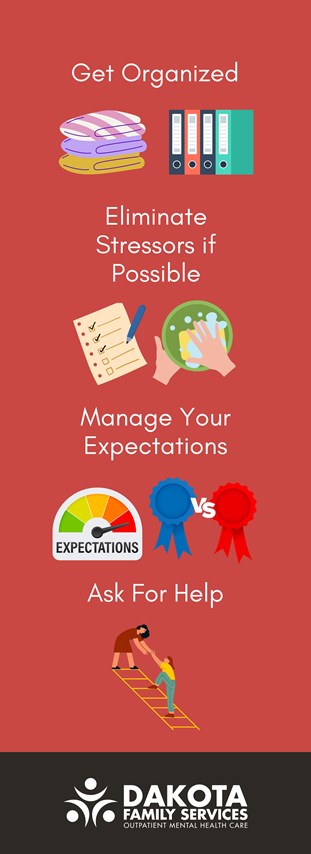In challenging times, you may find that you have little patience with other people or get upset over minor things. Anger and frustration are complicated emotions that often stem from other feelings, like disappointment, fear, and stress. Taking some extra steps to decrease your overall tension can prevent your feelings (and the reactions that they cause) from spiraling out of control.
If you or someone you know are dealing with intense anger and frustration that affects their mental health, Mental Health America and the mental health professionals at Dakota Family Services offer the following tips for coping.
1) Pause before reacting.

When you feel yourself getting mad, take a moment to notice what you're thinking, then take a few deep breaths or count to ten in your head. Try these breathing exercises.
By giving yourself even just a few seconds before reacting, you can put some emotional distance between you and whatever is upsetting you—and you might even realize that you're actually tense because of something else.
2) Change your surroundings.
Anger can make you feel trapped. Whether you're mad at someone in the same room as you or just angry at the world, sometimes physically relocating yourself can help you start to calm down. Go to another room or step outside for a few minutes of fresh air to help disrupt the track that your mind is on.
3) Get it all out.
Keeping your feelings bottled up never works, so allow yourself time to be angry and complain. As long as you don't focus on it for too long, venting can be a healthy outlet for your anger.
You can open up to a trusted friend or write it all down in a journal.
Sometimes it feels better to pretend to talk directly to the person (or situation) that you're angry at—pick an empty chair, pretend they're sitting in it, and say what you need to get off your chest.
Here are some more creative ways to express your anger.
4) Release built-up energy.
Anger is a high-energy emotion, and we store that energy and tension physically in our bodies.
Exercise is a great way to get rid of extra energy and can improve your mood.
Some people find grounding exercises (like meditation or deep breathing) helpful to calm intense feelings, while others prefer more high-impact activities, like running or weight lifting.

Learn more about how exercise effects mental health (podcast episode)—and— the surprising health benefits of meditation (podcast episode).
Think about what you usually do to decompress, like taking a hot shower or blasting your favorite music, and use the tools that you know work for you.
5) Get organized.
When things around you feel chaotic, it's often a lot easier to get frustrated and snap at people. Dedicate a few minutes each day to tidying, planning, or reorganizing.
Implementing a routine can also help you feel more on top of things by adding structure and certainty to your daily life.
6) Eliminate stressors if possible.
Sometimes there's no way to completely get rid of a big problem, but there's often more than just one issue contributing to your frustration. Things like an overwhelming workload or unhealthy relationships can make you feel on edge.
Pay attention to how and why you're feeling stressed and see if you can make small changes to improve a challenging situation to make it less burdensome.
7) Manage your expectations.
Negative feelings often stem from people or situations not meeting your standards or assumptions. It's frustrating to feel let down, but recognize that you can't fully predict anyone else's behavior or how situations will play out.
Shift your mental framework so that you aren't setting yourself up for disappointment. Learn more about managing expectations (when life doesn't go as planned).
8) Don't be afraid to ask for help.
If you're working to cope with your anger, but feel like you can't get it under control, it might be time to get some extra support.
Anger can fester and become explosive if not resolved. A number of mental health conditions can manifest as anger, so this may actually be a sign of depression or anxiety—treating an underlying condition can help heal your anger as well.



